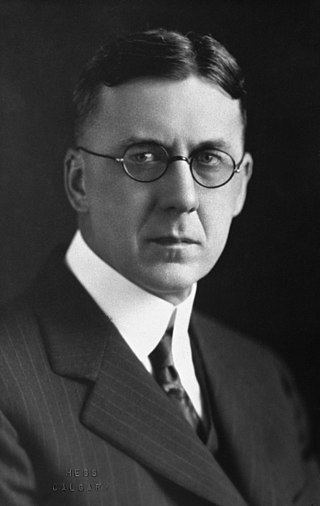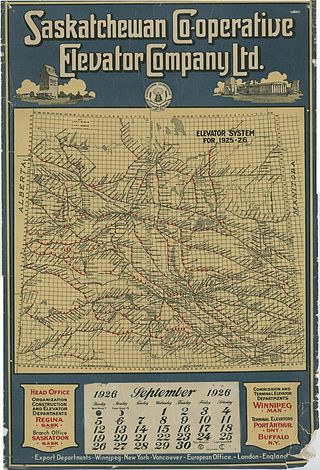
John Edward Brownlee, was the fifth premier of Alberta, serving from 1925 until 1934. Born in Port Ryerse, Ontario, he studied history and political science at the University of Toronto's Victoria College before moving west to Calgary to become a lawyer. His clients included the United Farmers of Alberta (UFA); through his connection with that lobby group, he was involved in founding the United Grain Growers (UGG).

A grain elevator is a facility designed to stockpile or store grain. In the grain trade, the term "grain elevator" also describes a tower containing a bucket elevator or a pneumatic conveyor, which scoops up grain from a lower level and deposits it in a silo or other storage facility.

Agricore United was a farmer-directed agribusiness in Canada. It supplied crop nutrition and crop protection products, and offered grain handling and marketing services. It was created on November 1, 2001 by the merger of Agricore and United Grain Growers. It was headquartered in Winnipeg, Manitoba. Its shares were publicly traded on the Toronto Stock Exchange (TSX) under the symbol "AU" until June 15, 2007, when it was taken over by the Saskatchewan Wheat Pool. Agri-business giant Archer Daniels Midland (ADM) had a 28% stake in the company at the time of the takeover.

The Alberta Wheat Pool was the first of Canada's wheat farmer co-operatives in 1923.

The Saskatchewan Wheat Pool was a grain handling, agri-food processing and marketing company based in Regina, Saskatchewan. The Pool created a network of marketing alliances in North America and internationally which made it the largest agricultural grain handling operation in the province of Saskatchewan. Before becoming Viterra, SWP had operated 276 retail outlets and more than 100 grain handling and marketing centres. The Saskatchewan Wheat Pool operated under the name of AgPro in the prairie provinces of Manitoba and Alberta. Begun as a co-operative in the 1920s, the company became a publicly traded corporation in the 1990s. After the 2007 takeover of its competitor, Winnipeg-based Agricore United, the Pool name was retired. The merged company operated under the name Viterra until 2013, when it was acquired by Glencore International.

Viterra began as a Canadian grain handling business, the nation's largest grain handler, with its historic formative roots in prairie grain-handling cooperatives, among them the iconic Saskatchewan Wheat Pool. Viterra Inc grew into a global agri-business with operations in Canada, the United States, Australia, New Zealand and China. Viterra operated three distinct, inter-related businesses: Grain Handling & Marketing, Agri-Products and Processing, enabling it to generate earnings at various points on the food production chain from field to the table. Following its $6.1-billion acquisition by Glencore International, on 1 January 2013, Viterra was merged with Glencore purchaser, 8115222 Canada Inc., headquartered in Rotterdam, the Netherlands.

A wheat pool is a co-operative that markets grain on behalf of its farmer-members.
Richardson International Limited is a privately held Canadian agricultural and food industry company headquartered in Winnipeg, Manitoba. The company is one of several companies that are owned by James Richardson & Sons Limited. The company is a worldwide handler and merchandiser of all major Canadian-grown grains and oilseeds and a vertically integrated processor and manufacturer of oats and canola-based products. Richardson has over 2,500 employees across Canada, the U.S. and U.K. Richardson International is a subsidiary of James Richardson & Sons, Limited, established in 1857.
The Warner elevator row is a group of four historic wood-cribbed grain elevators standing in a row from south to north alongside the Canadian Pacific Railway line from Great Falls, Montana to Lethbridge, Alberta at the east entrance of the village of Warner, Alberta, Canada. At one time, the row had at least seven elevators.

Manitoba Pool Elevators was a grain trade company founded in 1924. It became a subsidiary of the Saskatchewan Wheat Pool until November 1932, when the Pool declared bankruptcy. In 1998 Alberta Wheat Pool and Manitoba Pool Elevators merged to form Agricore Cooperative Limited. In 2001, United Grain Growers combined its business operations with Agricore Cooperative Ltd. and carried on business as Agricore United, a publicly traded company, no longer a farmer-owned cooperative. In 2007, Agricore United was taken over by the Saskatchewan Wheat Pool, another publicly traded company. The merged corporation was renamed Viterra.
The Manitoba Grain Growers' Association (MGGA) was a farmer's association that was active in Manitoba, Canada, in the first two decades of the 20th century. It provided a voice for farmers in their struggle with grain dealers and the railways, and was influential in obtaining favorable legislation. The MGGA supported the Grain Growers' Grain Company, a cooperative of prairie farmers, and its organ the Grain Growers' Guide. At first it remained neutral politically, but in 1920 it restructured as the United Farmers of Manitoba in preparation for becoming a political party.

The Saskatchewan Grain Growers' Association (SGGA) was a farmer's association that was active in Saskatchewan, Canada in the early 20th century. It was a successor to the Territorial Grain Growers' Association, and was formed in 1906 after Saskatchewan became a province. It provided a voice for farmers in their struggle with grain dealers and the railways, and was influential in obtaining favorable legislation. The association initially resisted calls to create a farmer-owned marketing company. Later it did support formation of the Saskatchewan Co-operative Elevator Company. The SGGA helped the Saskatchewan Wheat Pool, a cooperative marketing organization, to become established in 1924. In 1926 the SGGA merged with the more radical Farmers' Union of Canada, which had earlier split from the SGGA, to create the United Farmers of Canada,
The Territorial Grain Growers' Association (TGGA) was a farmer's association that was active in Western Canada at the start of the 20th century, in what was then the Northwest Territories and later became Saskatchewan and Alberta. It provided a voice for farmers in their struggle with grain dealers and the railways, and was influential in obtaining favorable legislation. After Alberta and Saskatchewan became provinces the TGGA was succeeded by the Alberta Farmers' Association and the Saskatchewan Grain Growers' Association.
The Alberta Farmers' Association (AFA) was a farmer's association that was active in Alberta, Canada from 1905 to 1909. It was formed from the Alberta branch of the Territorial Grain Growers' Association (TGGA) when Alberta became a province in 1905. It provided a voice for farmers in their struggle with grain dealers and the railways. In January 1909 it merged with the Canadian Society of Equity to form the United Farmers of Alberta.

Edward Alexander Partridge was a Canadian teacher, farmer, agrarian radical, businessman and author. He was born in Ontario but moved to Saskatchewan where he taught and then became a farmer. He was active in the Territorial Grain Growers' Association (TGGA), founded in 1902, which addressed various problems with the Western Canada grain market. He founded the cooperative Grain Growers' Grain Company, the predecessor of the United Grain Growers, and the Grain Growers' Guide, a widely distributed weekly paper. His "Partridge Plan" was a broad and visionary proposal for addressing a wide range of farmers' issues, eliminating many abuses caused by the near-monopoly of grain elevator companies, and resulted in important reforms by the provincial governments. Patridge was named a National Historic Person in 2018.

The Grain Growers' Guide was a newspaper published by the Grain Growers' Grain Company (GGGC) in Western Canada for grain farmers between 1908 and 1936. It reflected the views of the grain growers' associations. In its day it had the highest circulation of any farm paper in the region.

The Grain Growers' Grain Company (GGGC) was a farmers' cooperative founded in the prairie provinces of western Canada in 1906. The GGGC met strong resistance from existing grain dealers. It was forced off the Winnipeg Grain Exchange and almost failed. With help from the Manitoba government it regained its seat on the exchange, and soon had a profitable grain trading business. The company founded the Grain Growers' Guide, which became the most popular farmer's newspaper in the region. In 1912 the GGGC began operating inland and terminal grain elevators, and in 1913 moved into the farm supply business. The GGGC was financially secure and owned or operated almost 200 elevators as well as 122 coals sheds and 145 warehouses by the time it merged with the Alberta Farmers' Co-operative Elevator Company to form the United Grain Growers in 1917.

The Saskatchewan Co-operative Elevator Company (SCEC) was a farmer-owned enterprise that provided grain storage and handling services to farmers in Saskatchewan, Canada between 1911 and 1926, when its assets were purchased by the Saskatchewan Wheat Pool.

The Alberta Farmers' Co-operative Elevator Company (AFCEC) was a farmer-owned enterprise that provided grain storage and handling services to farmers in Alberta, Canada between 1913 and 1917, when it was merged with the Manitoba-based Grain Growers' Grain Company (GGGC) to form the United Grain Growers (UGG).























